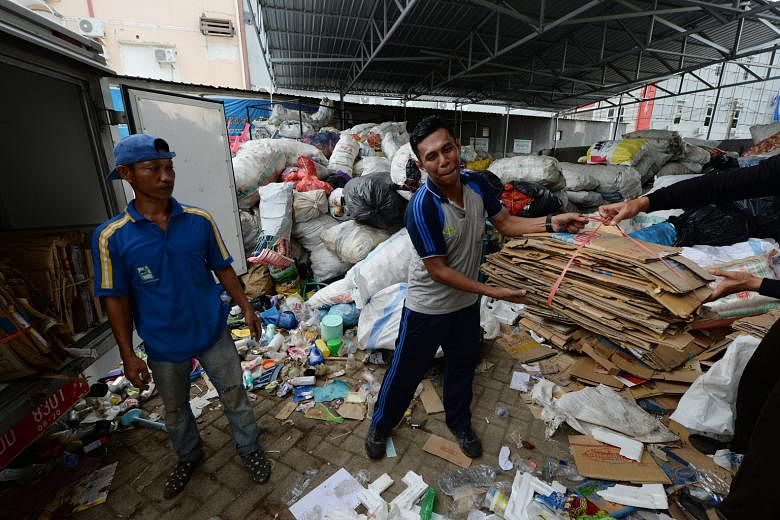MAKASSAR (Sulawesi) • It is clear from the dirt floor, the battered green sofa and the common-use comb hanging from a string next to the door that this is no ordinary bank. Customers here, in a poor corner of eastern Indonesia, borrow cash - and pay back trash.
"The programme originated from the people, it is managed by the people, and the rewards are for the people," said bank manager Suryana, who wears a black headscarf and lives with her family above the Mutiara Trash Bank in the fast-growing city of Makassar on the island of Sulawesi. "From an economic point of view, this gets results."
It is an idea that is about as far as can be from the technological developments disrupting banking elsewhere.
Not just in neighbourhoods in Indonesia, but elsewhere across emerging Asia and Africa, locales are embracing "trash banking" as a way of reducing pressure on ever-growing landfill sites and allowing some of their poorest citizens access to savings and credit.
The scale of the problem facing Makassar and other Asian cities is clear from a trip to the landfill on the edge of town.
Each day, the city of 2.5 million people produces 800 tonnes of rubbish, most of which ends up at the five-storey-high tip, which sprawls over the area the size of two soccer pitches.
Scavengers, many of them children, work alongside cows foraging for food. Against this backdrop, trash banking is taking off.
Residents take recyclable trash such as plastic bottles, paper and packaging to the collection points, known as banks, where the rubbish is weighed and given a monetary value.
Like a regular bank, customers are able to open accounts, make deposits - of trash, converted to its rupiah value - and periodically withdraw funds.
The city government commits to purchasing the rubbish at set prices displayed at the bank, ensuring price stability for those bringing trash in. It then sells it on to waste merchants, who ship it to plastic and paper mills on the main island of Java.
At other trash banks in the country, account holders can exchange their rubbish directly for rice, phone cards or paying their electricity bills.
At the Mutiara Trash Bank, several account holders had signed up for a homework programme, whereby local students help younger kids with their homework and are paid directly from the garbage bank.
Customers in Makassar, most of whom are women collecting trash part-time, typically save tiny amounts: around 2,000 rupiah to 3,000 rupiah a week, although others who collect rubbish more dedicatedly save much more.
Many also borrow money, most often to buy rice, towards the end of the week when they are awaiting their husbands' pay cheques.
The local authorities in Makassar are supported by a local non-governmental organisation that receives funding from PT Unilever Indonesia and is headed by Mr Saharuddin Ridwan, a former television journalist who covered the religious wars in eastern Indonesia.
"We must all take responsibility for rubbish," said Mr Ridwan.
BLOOMBERG

